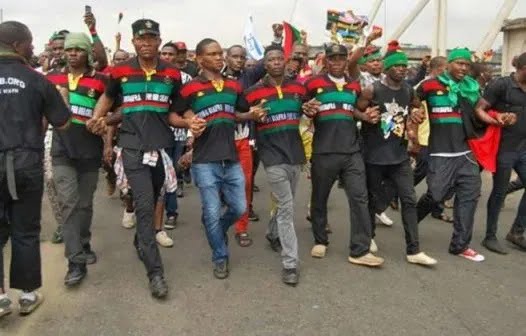
This year’s ‘Biafra Day’ is being commemorated low-key as Nigeria grapples with restrictions put in place to curb the coronavirus pandemic which has spread to all but one state in the West African country.
The event is marked every May 30 mostly by pro-Biafra sympathisers and many Igbos in remembrance of the brutal civil war which ended exactly 50 years ago after claiming millions of lives.
The Indigenous People of Biafra (IPOB), a separatist group calling for an independent Biafran country, has led protest march and rallies to mark the civil war. But this has often resulted in violent confrontations between them and security agencies over the past few years.
At least 150 peaceful pro-Biafra protesters were killed between August 2015 and August 2016 as Nigerian security forces embarked on – what Amnesty International described as – a chilling campaign of extrajudicial executions and violence in the Southeast.
During the 2017 Biafra Remembrance Day march, at least 60 people were killed as hundreds of protesters clashed with security forces across the Southeast region, according to Amnesty International.
IPOB resorted to sit-at-home protests the following years of ‘Biafra Remembrance Day,’ especially in the memory of pro-Biafra activists killed by security agencies over the years.
In 2018, the group called for the closure of all markets within “Biafran territory”, and a halt of all vehicular movements in the area from 12 a.m. on May 29 till midnight of May 30.
The order was overwhelming observed that year but partially adhered to in 2019.
Following lockdowns already in place against the coronavirus which has affected the Nigerian economy, the separatist group said it has replaced the sit-at-home order with a three-day fasting and prayer.
“There won’t be any sit-at-home or indoor protest or remembrance because our people have stayed much at home during the coronavirus lockdown. IPOB wouldn’t like to bother the people with another lockdown in form of sit-at-home”, Emma Power, IPOB media secretary said in a statement on Thursday.
“After much consideration and deliberations, IPOB high command, therefore, urges Biafrans both at home and in the diaspora to observe this year’s remembrance day with fasting and prayers.
“The programme for this year’s event will last for three days from May 27 to 30, 2020.
“This year’s episode and the event will start with prayers and end with prayers. There will also be a candle processions at every state, local government area, ward, and the church in our land.”
The Biafran Civil War
The Nigerian Civil War, better known as the Biafra war (July 6, 1967 – January 15, 1970), was a war fought between the government of Nigeria and the secessionist state of Biafra. Immediate causes of the war in 1966 included a military coup, a counter-coup, and persecution of Igbos living in Northern Nigeria.
Ultimately, it led to the declaration of a sovereign state of Biafra by the then 33-year-old military officer, Emeka Odumegwu Ojukwu at the helm in 1967.
In reaction, the Nigerian government declared war and after 30 months of fighting, Biafra surrendered. On January 15, 1970, the conflict officially ended.
The government’s policy of “no victor, no vanquished” may have led to a lack of official reflection, but many Nigerians of Igbo origin grew up on stories from people who lived through the war.
The government has often been condemned for not prioritizing the preservation of the historic event like other countries such as Rwanda and the U.S. who have also fought civil wars.
There is no date marked in the Nigerian calendar for the remembrance of the civil war and no cenotaph was built in remembrance of any of those who died.
These and many other perceived marginalisation fueled agitations from the Nnamdi Kanu-led IPOB that is at the vanguard of the call for the independent Biafra Republic from the Nigerian state through a referendum.
Other Activities to mark Biafra Day
Meanwhile, there are some other activities lined up for the remembrance event.
Human Rights activist and former Executive Chairman of National Human Rights Commission, Chidi Odinkalu is among Igbo leaders expected to speak, online, on Saturday, as part of 53rd anniversary of Biafra.
Other speakers include Social Scientist and founder of Enugu Center for Memories, Patrick Okigbo III; Nicholas Omenka, visiting Professor of History, Godfrey Okoye University, Enugu; Ifeoma Ezedinachi, lecturer, Department of History and International Studies, Godfrey Okoye University, Enugu; and Nana Nwachukwu, knowledge management advisor, DFID.
READ ALSO: Banker Commits Suicide After Marriage He Took N3M Loan Crashed After 2 Months
The BBC is also organizing a live panel session by 12 p.m. to mark the event. Those to speak are Onyeka Onwenu, singer and human rights activist; Nnia Nwodo, President of Ohanaeze Ndi Igbo, the apex Igbo socio-cultural organization; and Tony Nnadi.
Biafra war timeline compiled by the BBC
January 1966 – Nigerian government was overthrown in what was seen as an “Igbo coup” led by junior army officers
January 1966 – Lt Col Odumegwu-Ojukwu appointed the military governor of Eastern Region
July 1966 – Second coup masterminded by Murtala Muhammed, Lt Col Yakubu Gowon becomes head of state
June to October 1966 – Riots in northern Nigeria targeted at Igbos, killing many and forcing up to a million to return to south-eastern Nigeria
May 1967 – Ojukwu declares the independence of the Republic of Biafra
July 1967 – War begins
October 1967 – Biafran capital Enugu falls
May 1968 – Nigeria captures oil-rich Port Harcourt
April 1969 – Umuahia, new Biafran capital falls to Nigerian forces
January 1970 – Ojukwu flees Nigeria
January 1970 – Biafra surrenders
***
Via PREMIUM TIMES
